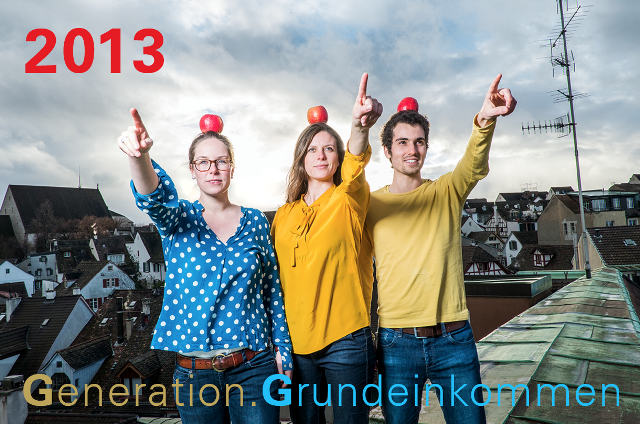Single News
Swiss parliament may soon debate unconditional basic income
DORNACH (NNA) – The Swiss model of direct democracy is something that is often admired. Last year alone the country held 12 referendums. And all that is required for a referendum to be held or for parliament to have to deal with an issue is 100,000 signatures.
Thus it is encouraging for the supporters of an unconditional basic income (UBI) that the initiative calling for such a move has already managed to collect 70,000 of the required 100.000 signatures. The possibility that the Swiss parliament will have to deal with the issue has thus moved considerably closer. Hardly surprising, then, that more than 200 people turned up at the beginning of March at the Goetheanum in Dornach for a public conference on the subject.
“Popular initiative for an unconditional basic income – does it make sense?” was the title of the event organised by the Social Science Section. The initiative for an unconditional basic income was started in 2012 and presents the concept not as welfare but as a basic civil right. The conference aimed to look at whether this made sense and at the possible social consequences if such a basic income for everyone were to be introduced. The initiative wants a new article to be inserted in the Swiss constitution which calls for the Swiss Federation to ensure “the introduction of the unconditional basic income. The basic income is intended to give everyone an existence fit for human beings and to enable them to participate in public life. The law shall regulate specifically the financing and level of the basic income.”
In order for the initiative to succeed, the signatures have to be collected by 11 October 2013.
The campaign is supported by many prominent people including the writer Walter Muschg. If the initiative is accepted, parliament is obliged to deal with the issue. The leader of the Social Science Section, Paul Mackay, welcomed many participants from Switzerland but also from neighbouring countries. The conference got underway with talks by Ursula Piffaretti, entrepreneur and founder of various institutions, and Enno Schmidt, artist, author and film maker.
Ursula Piffaretti described the difficulties of people who had become dependent on social welfare through no fault of their own while the dogma of “no money without work” had been drummed into us for the last 100 years. Although the welfare state provided many blessings, they were no longer sufficient for the future. She responded to the objection that people were lazy by nature with a quote from Rudolf Steiner: “If we find our impulses from before birth we won’t have any lazy people any more either.” UBI enabled the individual to discover the tasks which he or she had brought with them in the form of creative potential and to realise them.
Enno Schmidt considered direct initiatives to be a good instrument for bringing new things into the world. Two basic objections kept being raised: “Who is going to bother working?” and “Who is going to pay for it all?” The path to the UBI – including the debate about democracy – was as important at the goal. In view of the more complex professional lives of people today, Schmidt pointed out that the UBI was something that went with the person and not the job.
The “Generation Basic Income” initiative, which started in Basel, has meanwhile spread to many other cantons. Activists reported about the excitement and fun of collecting signatures. The first question which many people asked was which party stood behind the campaign. They immediately became more interested when told that the initiative was not affiliated to any party. Many of those who displayed an interest in the idea felt that it already existed as a living spiritual reality. But at the moment it was still something to think about, not something that would suddenly become reality.
But the activists also reported that the pessimistic view that people would stop working without external pressure or state sanction was still very widespread. It required great power of persuasion to change such lifelong attitudes. As an illustration of the Swiss view of democracy, one activist told about a Swiss politician who had signed not because she supported a basic income but because she found the debate fascinating.
Enno Schmidt added that there was a dynamic in this project which did not originate in a centrally controlled idea but remained a living process. Anything centralistic had a devastating effect on cultural life because it provoked power struggles.
The entrepreneur and founder of the “dm” chain of pharmacies in Germany, Götz Werner, who has worked tirelessly for an unconditional basic income, asked: “If we have never been so rich as now, why do we still put up with so much poverty?” Switzerland, with its long tradition of democracy was predestined for an unconditional basic income. If it were realised here it would act as a model for the rest of Europe. What mattered now was to create the framework conditions which would unlock the potential which was contained in every person.
END/nna/wgv
Item: 130430-02EN Date: 30 April 2013
Copyright 2013 News Network Anthroposophy Limited. All rights reserved.

